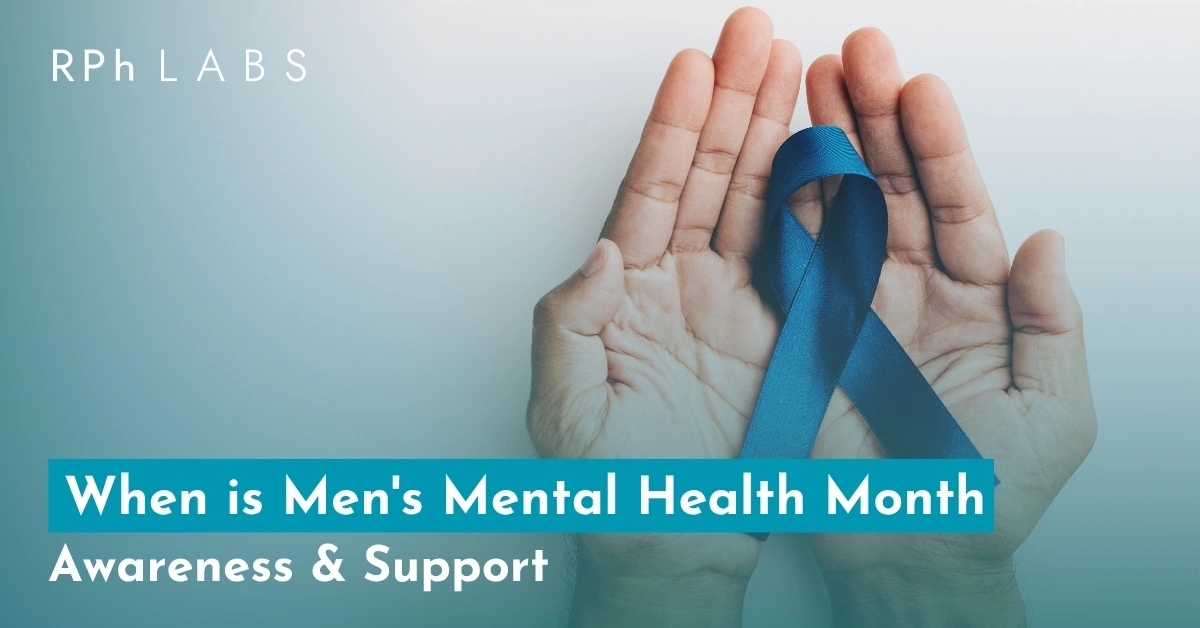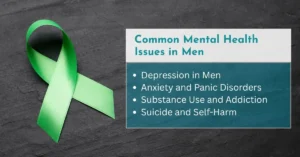
Men, often conditioned by societal norms to remain enduring and suppress emotions, struggle with mental health issues in silence. The stigma surrounding mental health in men, viewing vulnerability as weakness, is also contributing to severe issues, including higher rates of suicide. Their mental health is ignored enough that the majority of people are even unsure of ‘When is Men’s Mental Health Month’.
Celebrated each between June 10-16, especially in countries like the USA, UK, Australia, and some European countries, with the US being the first to establish this in 1994. This day plays an essential role in recognizing and addressing the significant challenges men experience in their lives.
The Symbolism and Importance
There’s no universally agreed-upon colour for Men’s Mental Health Month, though green ribbons have emerged as a symbol representing support for mental health awareness. The Wear Blue Day is observed on various dates, including National Human Trafficking Awareness Day on 11th of January, and on 2nd of April for world’s autism awareness, the one celebrated before the father’s days and during Men’s Health Week in June, encourages men discuss their male health issues, including mental health.
While the importance of mental health awareness for all genders is recognised globally, men’s mental health is often sidelined. The societal pressure on men to be “tough” and avoid showing emotions makes it difficult for them to seek help. This is why Men’s Mental Health Month is so important—it challenges these cultural stereotypes and opens the door for men to have meaningful, stigma-free conversations about mental well-being.
Thoughtful Gifts to Encourage Mental Health Awareness
Supporting someone through their mental health journey is one of the most valuable gifts. Here are a few thoughtful gift ideas to celebrate Men’s Mental Health Month:
- Books on Emotional Resilience: Books such as “The Mask of Masculinity” by Lewis Howes or “I Don’t Want to Talk About It” by Terrence Real explore male mental health in-depth, offering tools for emotional healing.
- Mindfulness Tools: Subscriptions to apps like Headspace or Calm, guided journals, or stress-relief gadgets such as weighted blankets or fidget toys can be helpful for relaxation and anxiety management.
- Therapy Sessions: Offering a gift certificate for therapy or a mental wellness retreat could empower someone to take the first step toward professional help.
Common Mental Health Issues in Men:
Men face a unique set of mental health challenges, many of which are overlooked or misdiagnosed due to cultural expectations and a reluctance to seek help.
1. Depression in Men
In men, depression often appears differently compared to women. Rather than typical sadness or withdrawal, men may show signs of irritability, anger, or aggression. The physical symptoms more often experienced include, but are not limited to, tiredness, muscle pain, or sleep disturbances. This makes it harder for both the individual and those around them to recognise the signs of depression.
Warning Signs:
- Loss of interest in activities or hobbies previously enjoyed.
- Increased irritability or feelings of frustration.
- Self-destructive behaviours, such as alcohol, drug abuse, etc.
Did you know?
PGx testing (pharmacogenomics testing) gives you insights into your genetic makeup, providing the basis of tailored medication. Thus, reducing trial and error while increasing efficacy.
2. Anxiety and Panic Disorders
Anxiety in men is often linked to stress from work, relationships, and general expectations from the society. Men may avoid seeking help due to the stigma associated with being perceived as “weak” or “overly emotional.”
Warning Signs:
- Chronic worry or restlessness.
- Physical symptoms like dizziness or rapid heartbeat.
- Avoidance behaviors, such as staying home from social events or skipping work.
3. Substance Use and Addiction
Substance abuse can be a form of self-medication for deeper mental health struggles, such as depression, trauma, or anxiety. Men, particularly those in high-stress environments or with emotional suppression tendencies, may turn to alcohol or drugs to cope with their emotions.
Link to Mental Health:
- Increasing substance use as a form of emotional escape
- Increased risk of addiction due to untreated underlying issues
4. Suicide and Self-Harm
Suicide rates are significantly higher among men than women, with men accounting for nearly 75% of all suicide deaths in the U.S. Men are less likely to seek help due to cultural stigma and societal norms about masculinity. As a result, many suffer in silence until the mental health crisis worsens.
Contributing Factors:
- Societal pressure to be “strong” or “resilient”.
- Limited mental health resources targeted specifically toward men.

Steps to Improve Men’s Mental Health: Breaking the Stigma
Addressing men’s mental health requires concerted efforts at the individual, societal, and policy levels. Here’s a more thorough approach to improving men’s mental health:
1. Encouraging Emotional Expression
One of the primary steps in improving men’s mental health is changing the narrative around masculinity. Society must recognize that it is okay for men to express helplessness in certain cases. Open conversations in homes, workplaces, and schools may help in breaking the barriers that prevent men from seeking help.
Approaches:
- Normalise discussions of emotions in everyday interactions.
- Provide educational resources in schools and workplaces on emotional intelligence.
Note: While some men shall recover only with basic therapies, others may require medication, such as antidepressants, e.g., Lexapro and Paxil. These medications may affect individuals differently and thus should be administered according to your genetic makeup – a pharmacogenomic test helps you here. Here is how it works.
2. Promoting Therapy for Mental Health
Therapy plays an essential role in helping men navigate complex emotions. Cognitive Behavioural Therapy (CBT), Talk Therapy, and Mindfulness-Based Stress Reduction (MBSR) are all effective treatment options for men experiencing anxiety, depression, and stress-related disorders.
Actionable Steps:
- Incorporate therapy as a first-line resource for dealing with mental health.
- Offer more affordable and accessible options for men to access mental health professionals.
3. Providing Male-Specific Mental Health Resources
Men often feel more comfortable discussing mental health with others who share their experiences. Creating safe spaces—like men’s mental health groups or tailored wellness retreats. Creating such discussion platforms can empower men to express their struggles without fear of judgment.
Examples:
- To promote mental well-being, the ManKind Project, available in 27+ countries, offers men’s groups, trainings, and some other resources.
- Mental Wellness Retreats offer a complete approach to tackling stress and anxiety, focusing on physical, emotional, and spiritual health.
Book your non-invasive and at-home PGx test from RPh LABS today and know your body’s response to 250+ medications.
4. Raising Awareness and Education
More education about men’s health challenges is needed to break the cultural taboos surrounding mental illness. Men’s Health Awareness Month, Mental Health Awareness Week, and similar healthcare observances like September Health Observances should include resources about male mental health challenges and treatment options.
Impact:
- Raising public awareness can reduce stigma and inspire men to seek support.
- Educating the broader community about recognising signs of mental health struggles in men can save lives.
5. Workplace Mental Health Policies
Workplaces should prioritize mental health by offering employee assistance programs (EAPs), mental health days, and stress management training. Men in particular face pressure to perform, leading to burnout and mental health issues.
Solutions:
- Implement workplace wellness programs with a focus on mental health.
- Train leaders to recognise the signs of mental health struggles in male employees and to provide appropriate support.
Global Recognition: The Benefits of Acknowledging Men’s Mental Health Month
Countries around the world recognise the importance of focusing on mental health, and Men’s Mental Health Month provides an essential platform for addressing this issue. Nations such as the UK celebrate November Men’s Health Awareness Month, while Australia recognises Men’s Health Week in June. These observances are critical for encouraging open dialogue, offering resources, and breaking down stigma.
Countries that actively support mental health awareness have seen positive results, such as a reduction in suicide rates and an increase in the number of men seeking therapy.
The Path Forward: Improving Men’s Mental Health Globally
Men’s mental health deserves as much attention as women’s. As we move forward, it’s critical that we:
- Normalize conversations about mental health for men.
- Prioritize resources and mental health services that are tailored to male needs.
- Continue advocating for more societal change around masculinity, helping men realize it is okay to seek help.
Only through these actions can we truly make progress in improving mental well-being for men and reducing the mental health crisis many experience silently.
Conclusion:
First established in the US back in 1994, Men’s Mental Health Week starts the second week, from June 10-16. If you’re wondering ‘how to help someone with anxiety?’, it’s not that difficult, start with a conversation, understand their pain point, take them to a doctor (if required) – to sum up, lend a hand to pull them out of the depression or anxiety phase. And remember, the FDA itself has recommended genome-based dosing for numerous mental health medications. Here you may find the Pharmacogenomic Biomarkers in Drug Labeling.
Disclaimer: This is just for informational purposes. Always consult your healthcare expert before taking any medical action.



Leave a Reply